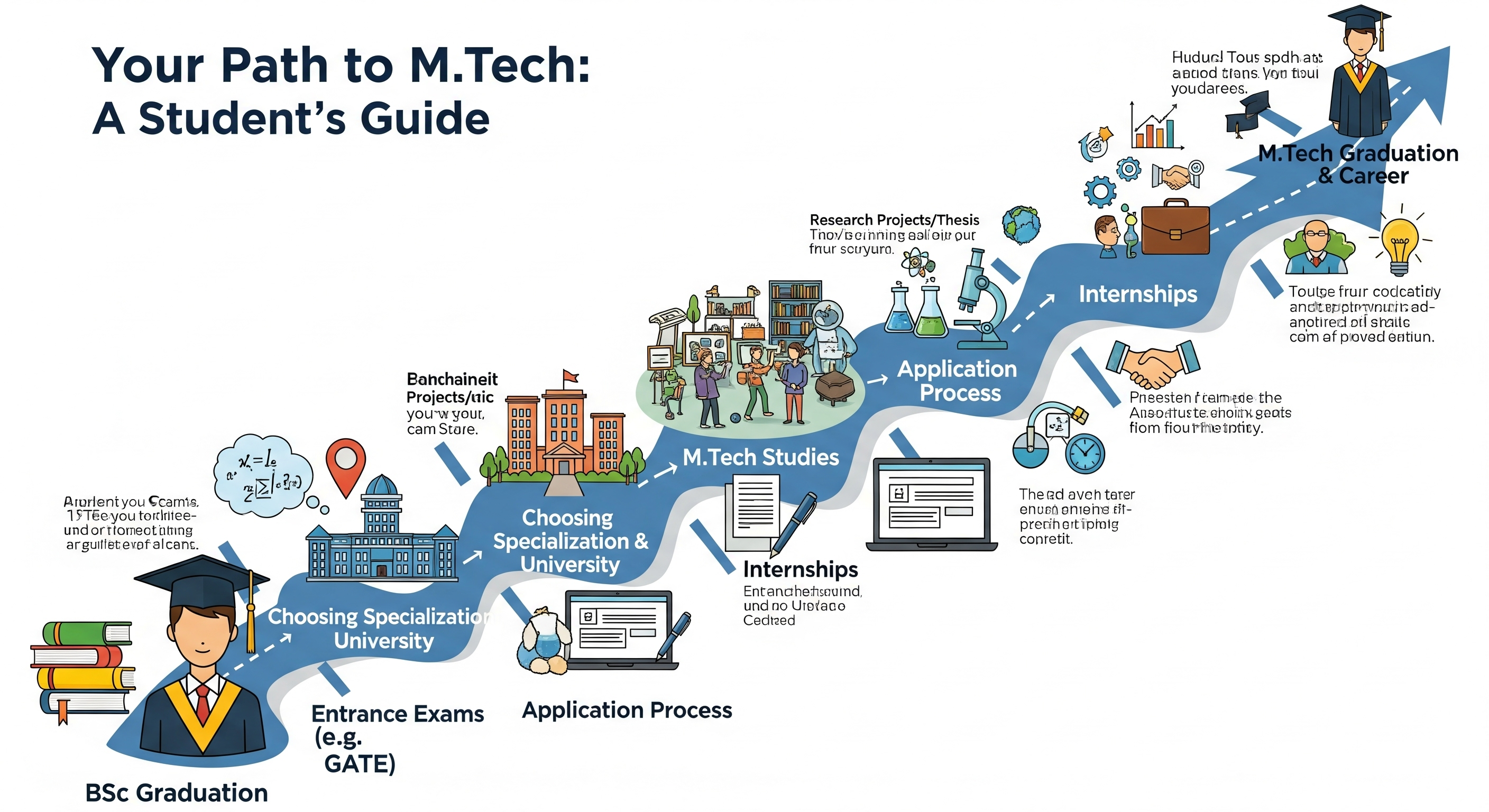
Can I Do MTech After BSc? A Complete Guide for Students *
Have you ever come across a thought of pursuing MTech after BSc, or what specific path do you need to follow to be eligible for post-BSc MTech? Could this combination ever exist? Pretty confusing, right? However, there is no need to feel alienated while thinking about this, since you are not the only one seeking clarity over such questions. Now, talking about the answer and possibility, then, yes, a BSc (Bachelor of Science) graduate can pursue an M.Tech degree. But the approach is slightly conditional depending on the type and duration of the BSc program you completed.
Traditionally, B.Tech or equivalent 4 years of engineering study was the baseline eligibility for M.Tech admissions. Under India’s New Education Policy (NEP) 2020, however, a 4‑year BSc (Hons./Research) has been equated with B.Tech, thereby enabling such students to appear for post-BSc MTech admissions directly. For those who completed a 3-year BSc, the usual path goes via an MSc in a related field, after which you can qualify for M.Tech either through entrance exams or specific institute norms. What this reflects is a shift toward interdisciplinary education while maintaining rigour.
This guide demystifies the process by discussing the criteria for MTech eligibility after BSc, GATE, and other entrance exams, relevant specialisations, and conditions related to institutions that accept BSc graduates.
The New Education Policy (NEP) 2020 & MTech Eligibility for B.Sc
Well, getting to know about and understanding the eligibility criteria and rules is one of the crucial steps towards planning your post-BSc M.Tech path effectively. Here's what you need to know as a BSc graduate:
NEP’s 4‑Year BSc (Hons./Research) Option: Under the NEP 2020, universities can officially offer a 4-year B.Sc programme with Honours/Research, which will include rigorous coursework and a research project. Therefore, the candidates can now directly apply for admissions in M.Tech after graduation, crossing a minimum percentage criteria (typically 50–60% or CGPA 6.0+).
Route for 3‑Year BSc Graduates: Traditional 3-year BSc graduates would typically need a relevant MSc degree before applying to M.Tech programs, in order to meet academic equivalence. Along with this, there are even a few institutes that may allow entry into integrated MSc‑MTech tracks or research-driven programs that waive this requirement, but policies vary by institution
Entrance Exam Requirement (GATE):
- A valid GATE score is required to get admissions into M.Tech after graduation from the majority of top-tier institutes, for which the B.Sc. graduates are eligible to appear for GATE, provided they select a relevant paper depending on their specialisation subject.
- There is no age limit, and candidates can take GATE multiple times.
Other Entrance Exams:
- There are some state and private universities which prefer conducting their separate common entrance tests and are open to providing admissions to post-B.Sc. M.Tech courses to graduates with M.Sc. qualifications or specific research backgrounds.
- The route can sometimes bypass GATE requirements, particularly in institutions with flexible eligibility norms.
Minimum Marks Requirement: Many colleges need students to have at least 50–60% marks or a CGPA of 6.0 or higher to be eligible for admission. However, some top-tier institutes like IITs may require higher scores, such as a CGPA of 7.5 or 75%.
Entrance Exams for M.Tech After BSc
If you're aiming for M.Tech after BSc, here's your roadmap on how to prepare for entrance exams, especially GATE, which is the gateway for getting into top technical institutions in India:
GATE Exam: Eligibility and Importance:
- Graduate Aptitude Test in Engineering (GATE) is a national-level entrance test widely meant for engineering degree holders planning to grab admission in M.Tech, ME, or directly into PhD programs across the majority of Indian institutes. Besides this, a GATE scorecard can also be used to get placement opportunities in many Public Sector Undertakings (PSUs).
- Talking about the eligibility to appear for GATE, it allows final-year or graduated students of Engineering/Technology with a bachelor’s or a master’s degree in a related stream in any relevant science stream to write it.
- There is no age bar, and no minimum number of attempts. GATE result remains valid for 3 years — long enough to cover any MSc course that one has yet to complete.
Choosing the Right GATE Paper for Your Background
Match your BSc specialisation with the GATE paper most aligned to your subject:
BSc Discipline |
Suggested GATE Paper Code |
|---|---|
| BSc in Computer Science / IT | CS (Computer Science & IT) |
| BSc in Physics | PH (Physics) |
| BSc in Mathematics / Statistics | MA (Mathematics), ST |
| BSc in Electronics / Chemistry | EC or CY |
| BSc in Biotechnology | BT (Biotechnology) |
This side-by-side alignment ensures that you pick up the most appropriate GATE subject paper considering your BSc discipline and improve your chances of becoming MTech eligible after BSc.
Strategic Advantages of a Good GATE Score
- Most IITs, NITs, IISc, and premier institutions use GATE for M.Tech admissions. A competitive score is mandatory for financial aid (if available) and merit-based entry.
- PSUs like ONGC, BHEL, ISRO, and NTPC also recruit candidates based on GATE rank, creating strong job prospects post-degree.
Alternatives to GATE
- Some state and private universities might consider you M.Tech eligible post-B.Sc. with or without GATE, using their own institution-specific entrance tests.
- Such options are useful if your academic path includes a 3-year B.Sc. plus M.Sc. and you want to bypass the GATE requirement.
M.Tech Specialisations for BSc Graduates
If you’re coming from a BSc, selecting an M.Tech specialisation aligned with your undergraduate subject helps you capitalise on your strengths and adapt more easily. Here's a mapping to help you make informed decisions before kickstarting your Post-BSc M.Tech journey:
BSc Background |
Recommended M.Tech Specialization |
Why It's a Good Fit |
|---|---|---|
| BSc Computer Science / IT | M.Tech in Computer Science and Engineering, M.Tech in Data Science ; AI/ML; Cybersecurity | Direct progression, strong foundation in programming and logic. |
| BSc Mathematics / Statistics | M.Tech in Computational & Data Sciences; Machine Learning; AI | Strong analytical background is ideal for modeling, AI, and data analytics |
| BSc Physics / Electronics | M.Tech in Electronics & Communication Engineering; VLSI; Signal Processing | Physicists adapt well to hardware, instrumentation, and communication systems |
| BSc Biotechnology / Life Sciences | M.Tech in Biomedical Engineering, M.Tech in Biotechnology | Combines biological knowledge with engineering principles. |
| BSc Chemistry / Materials | M.Tech in Materials Engineering; Nanotechnology; Chemical Engineering | Chemistry graduates excel in materials, process engineering, and nano-tech domains |
Job Opportunities After an M.Tech (Post-B.Sc)
Earning an M.Tech after a B.Sc sets you apart as a candidate with both scientific depth and engineering expertise. Here’s a look at where this path can lead you:
Typical Job Roles & Domains
Here are some job roles which can be achieved from specific domains:
- Core Engineering: One of the most common domains in which one can try getting jobs for the roles of Technical Lead, Process Engineer, and Systems Analyst.
- Software & Tech: Another highly demanding domain through which one can target achieving roles like Software Developer, Data Scientist, AI/ML Engineer, Cybersecurity Analyst.
- Research & Academia: If you are aiming for a more academia-based domain, then the job options could be a Research Associate, Assistant Professor, or doctoral pursuits like a Ph.D.
- Government & Public Sector: Many also specially aim for government-related domains through which one gets chances to explore job opportunities in DRDO, ISRO, BARC, or public R&D wings.
- Consultancy & Industrial Expertise: For a domain with a semi-technical touch, job roles available are Technical Consultant or specialist roles in manufacturing, healthcare, and materials technology.
Conclusion
Now that you know that doing an M.Tech after B.Sc may be a reality not just due to NEP 2020 but because of the general acceptance of four-year B.Sc (Honours/Research) and B.Sc + M.Sc combinations as equivalent to engineering degrees. The bottom line lies in strategic planning, correct specialisation selection, GATE (or applicable entrance exam) qualification, and then applying to a receptive institution. The opportunities that will come with an M.Tech are numerous, ranging from R&D and academia to high-technology posts in artificial intelligence, biotech, and engineering, and even some of the best placements wherein some M.Techs take home almost ₹46 lakhs per annum. It’s a powerful bridge from science to technology: make your move wisely!
FAQs


